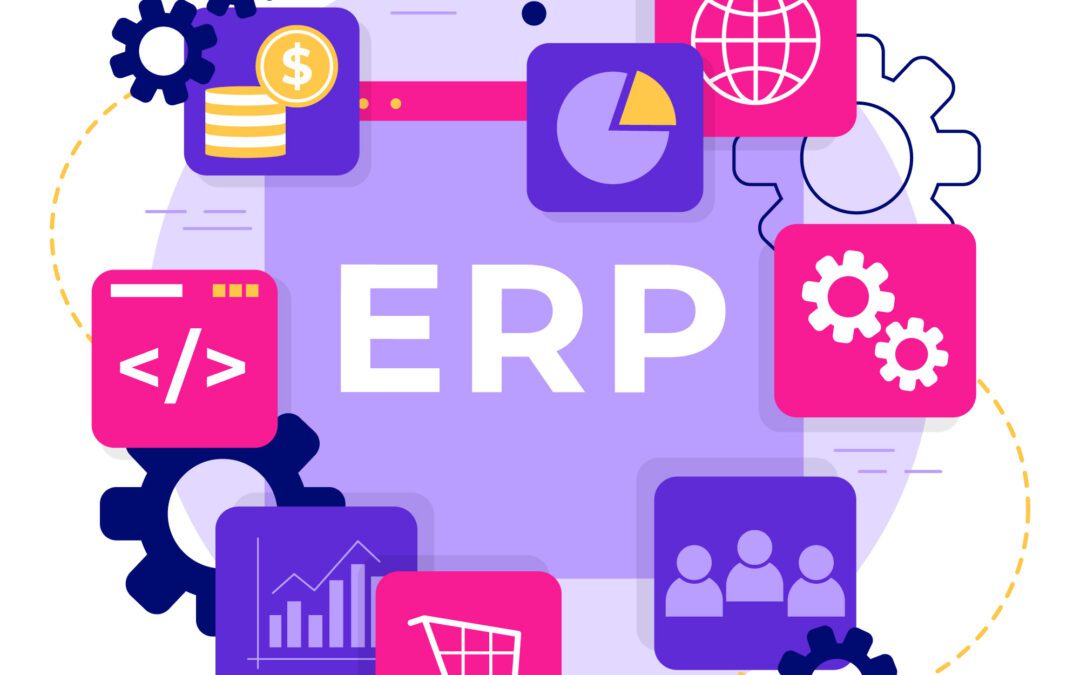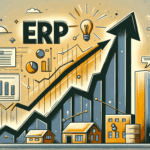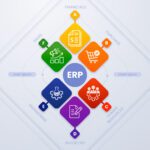In today’s rapidly evolving digital business landscape, enterprise resource planning (ERP) software is no longer a luxury—it’s a necessity. However, not all ERP solutions are created equal. Among the many options available, one name consistently stands out: SAP. Whether you’re a startup scaling operations or a Fortune 500 enterprise managing global operations, choosing the right ERP platform can define your business’s success.
This article will explore the critical reasons why SAP is better than a traditional ERP system, examining everything from functionality and integration to scalability and innovation. We’ll dive deep into what sets SAP apart and why businesses across the globe continue to place their trust in it.
Table of Contents
What Is ERP Software?
ERP (Enterprise Resource Planning) is a type of software that businesses use to manage and integrate the essential parts of their operations. ERP software applications automate and support a range of administrative and operational business processes including finance, HR, supply chain, manufacturing, services, procurement, and others.
Popular ERP solutions include:
-
Oracle ERP Cloud
-
Microsoft Dynamics 365
-
NetSuite
-
SAP ERP
While these platforms offer valuable features, SAP continues to outshine its competition for reasons we will explore throughout this guide.
Understanding SAP: More Than Just an ERP
SAP (Systems, Applications, and Products) started in 1972 and has since grown into the world’s leading ERP software provider. With over 400,000 customers in more than 180 countries, SAP’s software goes beyond basic ERP functionalities to deliver intelligent enterprise capabilities.
Unlike many generic ERP systems, SAP is an enterprise-wide solution that unifies departments, connects workflows, and enhances decision-making with real-time insights.
SAP’s most renowned offerings include:
-
SAP S/4HANA – The next-generation ERP suite
-
SAP Business One – Ideal for small to mid-sized enterprises
-
SAP Business ByDesign – A comprehensive cloud ERP for fast-growing businesses
SAP vs Traditional ERP: Key Differences
Let’s compare SAP with standard ERP systems across various dimensions:
| Feature | Traditional ERP | SAP |
|---|---|---|
| Customization | Limited to basic processes | Highly customizable across all industries |
| Cloud & On-Premise Support | Often rigid with deployment | Flexible: On-premise, cloud, or hybrid |
| Real-time Data Processing | Often batch processed | Powered by in-memory computing (SAP HANA) |
| AI/ML Integration | Limited or third-party | Embedded within core applications |
| Mobility | Often requires third-party tools | Native mobile apps and dashboards |
| Updates & Innovation | Slower development cycles | Continuous innovation through SAP BTP |
Verdict: SAP is more advanced, flexible, and robust than most traditional ERP systems.

Take Control of
Supplier Compliance
Never miss a certification expiration again with
automated alerts and reminders.
Comprehensive Business Integration with SAP
SAP offers seamless integration across all departments—from procurement to sales, from accounting to customer service. One of SAP’s biggest strengths is its ability to connect business processes and data into one intelligent system.
With SAP S/4HANA, companies benefit from:
-
Unified data models
-
End-to-end process automation
-
Centralized data access
-
Real-time analytics dashboards
For example, a sales rep using SAP can instantly check product availability, initiate an invoice, and track order fulfillment—all without switching platforms.
Why SAP Leads in Industry-Specific Solutions
One of the standout features of SAP is its industry-specific capabilities. While traditional ERP systems often offer one-size-fits-all solutions, SAP tailors its software to specific industries, including:
-
Manufacturing
-
Retail
-
Healthcare
-
Automotive
-
Energy and Utilities
-
Public Sector
-
Financial Services
With pre-configured templates and best practices for each vertical, SAP reduces implementation time and ensures faster ROI.
🔗 Explore SAP Industry Solutions
Superior Scalability: Grow Without Constraints
SAP systems are built for enterprises of all sizes, from startups to global conglomerates. Unlike legacy ERP systems that often struggle with growth, SAP offers unmatched scalability.
You can start with SAP Business One and upgrade to SAP S/4HANA as your business expands. The system adapts easily to:
-
New users
-
Additional modules
-
Global expansion
-
Evolving regulatory needs
This makes SAP a future-proof solution capable of growing with your business.
SAP’s Advanced Technology and Innovation
SAP has heavily invested in next-generation technologies that redefine ERP systems.
Some of the standout innovations include:
-
SAP HANA: In-memory database platform offering real-time processing
-
AI and Machine Learning: Automates routine tasks and enhances predictive capabilities
-
SAP Business Technology Platform (BTP): Enables app development, analytics, and integration
-
IoT & Blockchain Integration: Extends SAP’s functionality for modern use cases
SAP is not just keeping up with digital transformation—it’s leading it.
User Experience and Mobility
SAP’s Fiori UX is designed to offer a modern, intuitive user interface across devices. It allows employees to work efficiently—whether in the office or on the go.
Key highlights:
-
Role-based dashboards
-
Responsive mobile interfaces
-
Real-time push notifications
-
Self-service portals for employees and customers
Compared to clunky legacy ERP UIs, SAP offers a refreshing and efficient experience for both technical and non-technical users.

Simplify Your RFP
Management
Automate your RFPs, track responses, and
make data-driven decisions.
Global Support and Localization
SAP supports multi-currency, multi-language, and multi-legal frameworks, making it ideal for international businesses.
It offers:
-
Local tax compliance tools
-
Country-specific templates
-
Global data centers
-
24/7 enterprise-grade support
Many ERP systems struggle to adapt to international needs, but SAP is truly global, with thousands of partners and consultants across the world.
Security and Compliance Standards
When it comes to security, SAP meets the highest industry standards, including:
-
ISO/IEC 27001
-
SOC 1, 2, and 3
-
GDPR compliance
-
Role-based access controls
SAP also provides regular patch updates, encryption protocols, and real-time threat detection using SAP Enterprise Threat Detection tools.
🔐 Learn more: SAP Security and Compliance
Cost vs Value: Is SAP Worth the Investment?
It’s no secret—SAP can be expensive, especially compared to small ERP vendors. But the value it delivers outweighs the cost for most organizations.
Key ROI Factors:
-
Reduced operational costs
-
Real-time decision-making
-
Enhanced productivity
-
Lower compliance risk
-
Increased customer satisfaction
Plus, SAP offers flexible pricing models based on the size and needs of your business.
🧮 For a detailed ROI calculator, visit: SAP Value Lifecycle Manager
Conclusion: Why SAP is the Ultimate ERP Choice
So, why is SAP better than ERP? Because SAP isn’t just another ERP—it’s an intelligent enterprise platform that empowers businesses to innovate, grow, and lead. From real-time data processing and AI-driven insights to unmatched scalability and global support, SAP stands miles ahead of traditional ERP systems.
For organizations that want a comprehensive, future-ready, and customizable ERP solution, SAP is the clear winner.
Ready to Take the Next Step?
If you’re serious about digital transformation and operational excellence, it’s time to explore what SAP can do for your business.
➡️ Visit the official SAP website to learn more.
Would you like me to format this content into your WordPress site, or help you with SEO meta tags and schema markup? Let me know and I’ll assist right away.
You said:
ChatGPT said:
Created with AIPRM Prompt “Written SEO Article | 100% Human Content Score | Keyword-Rich Content”
Why Is SAP Better Than ERP?
In today’s digitally driven business landscape, Enterprise Resource Planning (ERP) systems have become essential for managing operations efficiently. But within this domain, one name continues to outshine all others: SAP. With advanced features, industry-specific capabilities, and unmatched scalability, SAP offers more than a traditional ERP. In this article, we’ll break down the key reasons why SAP is considered superior to other ERP systems and how it empowers businesses across industries.
What is ERP Software?
ERP software integrates core business processes such as finance, HR, inventory, supply chain, and procurement into a single system. Traditional ERP platforms often streamline operations but may fall short in terms of flexibility, innovation, and scalability.
ERP systems typically:
-
Automate daily business tasks
-
Improve departmental collaboration
-
Provide basic data insights
-
Centralize data storage
While these features are helpful, traditional ERP systems can be rigid, hard to customize, and slow to adapt to changing business needs.
What is SAP?
SAP (Systems, Applications, and Products) is more than just an ERP—it’s a full suite of intelligent enterprise tools designed for businesses of all sizes. Founded in 1972, SAP has grown into a global leader with over 400,000 customers in 180+ countries.
SAP offers multiple ERP products, such as:
-
SAP S/4HANA: A next-gen intelligent ERP suite powered by in-memory computing
-
SAP Business One: An affordable solution for small to mid-sized businesses
-
SAP Business ByDesign: A cloud ERP for fast-growing mid-market firms
SAP’s offerings cover all industries and business types, making it the most comprehensive ERP solution on the market.
SAP vs Traditional ERP: Key Differences
Let’s explore the main differences that set SAP apart from traditional ERP systems:
| Feature | Traditional ERP | SAP |
|---|---|---|
| Customization | Limited and complex | Highly configurable for any industry |
| Data Processing | Batch-based | Real-time with SAP HANA |
| Integration | Often requires third-party tools | Native, seamless integration |
| Cloud Flexibility | Limited | On-premise, cloud, or hybrid options |
| Innovation | Minimal | Embedded AI, ML, IoT, and analytics |
| Industry Coverage | Generic | Industry-specific templates and features |
Conclusion: SAP provides a smarter, faster, and more scalable ERP experience.
Comprehensive Integration Capabilities
One of SAP’s greatest strengths is its ability to seamlessly integrate multiple business functions. Whether you’re managing finance, inventory, procurement, or customer service, SAP ensures all departments communicate and share data in real-time.
With SAP:
-
Finance can access real-time sales data
-
Procurement can forecast needs based on inventory levels
-
HR can integrate payroll with project billing
-
Sales teams can generate invoices automatically
Result: You operate as a unified, agile, and efficient business.
Industry-Specific Solutions
Traditional ERP systems often offer one-size-fits-all functionality. SAP, however, provides pre-configured solutions for over 25 industries, including:
-
Manufacturing
-
Healthcare
-
Retail
-
Automotive
-
Public Sector
-
Energy
-
Banking
Each industry solution includes:
-
Custom workflows
-
Regulatory compliance tools
-
Role-specific dashboards
-
Best practice templates
🔗 Explore SAP Industry Solutions
This focus helps businesses accelerate implementation and reduce total cost of ownership (TCO).
Real-Time Decision-Making with SAP HANA
SAP HANA is an in-memory database that powers SAP S/4HANA. It provides real-time data processing, helping leaders make instant, informed decisions.
Benefits include:
-
Live analytics dashboards
-
Real-time financial consolidation
-
Predictive insights for demand planning
-
Instant access to KPIs
Traditional ERP systems, which rely on batch data processing, lack this real-time advantage, often delaying critical decisions.
Advanced Technologies Built-In
SAP is constantly evolving with the latest technologies, including:
-
Artificial Intelligence (AI) for automated decision-making
-
Machine Learning (ML) for predictive analytics
-
Internet of Things (IoT) for asset tracking
-
Blockchain for secure data transactions
These features are not add-ons; they are natively embedded into SAP platforms. Businesses using SAP are future-ready by default.
Scalable for All Business Sizes
SAP is often seen as an enterprise solution, but it’s equally powerful for small and medium-sized enterprises (SMEs). With products like SAP Business One and SAP Business ByDesign, smaller companies can enjoy:
-
Modular features (pay for what you need)
-
Affordable cloud deployment
-
Easy upgrades as you grow
-
Local and global compliance support
When you’re ready to scale, SAP solutions scale with you—without needing to migrate to another platform.
Superior User Experience: SAP Fiori
SAP Fiori is SAP’s design language focused on user experience. It offers:
-
Mobile-responsive design
-
Role-based dashboards
-
Drag-and-drop features
-
Real-time alerts and notifications
Users can access SAP from any device, anywhere in the world, with a consistent and intuitive interface.
This is a stark contrast to many ERP systems, which often come with outdated and clunky interfaces.
Global Compliance and Localization
Operating in multiple countries means dealing with:
-
Tax regulations
-
Currency conversions
-
Language barriers
-
Legal reporting standards
SAP handles all of this effortlessly with built-in localization for 190+ countries. It also offers multi-language support and regularly updates tax compliance modules to align with regional regulations.
Whether you’re in Dubai or Detroit, SAP ensures you remain compliant and operational.
Enterprise-Grade Security
SAP has invested heavily in cybersecurity to protect sensitive business data.
Security features include:
-
Role-based access control
-
Data encryption at rest and in transit
-
Real-time threat detection
-
Compliance with GDPR, SOC, and ISO standards
🔐 SAP Security and Trust Center
This level of protection is essential in today’s data-sensitive world, especially for companies operating globally.
Is SAP Worth the Investment?
SAP is not the cheapest option, but it offers excellent value for the investment.
Return on Investment (ROI) comes from:
-
Lower operational costs
-
Higher productivity
-
Faster decision-making
-
Reduced compliance risks
-
Better customer experiences
With SAP, businesses future-proof their operations and minimize the risk of needing expensive system overhauls later.
For ROI calculators and business case templates:
➡️ SAP Value Lifecycle Manager
Customer Success Stories
Here are a few real-world examples:
-
Coca-Cola uses SAP S/4HANA to manage global bottling operations in real time
-
DHL improved logistics efficiency using SAP’s supply chain management tools
-
Adidas accelerated time-to-market with SAP’s real-time product lifecycle tools
-
Nestlé runs finance, procurement, and manufacturing on SAP globally
These global giants chose SAP not just for ERP—but for an intelligent enterprise experience.
Conclusion: Why SAP is Better Than Traditional ERP
So, why is SAP better than ERP?
Because SAP isn’t just another ERP. It’s a complete, intelligent platform built to:
-
Optimize every aspect of your business
-
Enable real-time decisions
-
Scale effortlessly
-
Secure your data
-
Support industry-specific needs
-
Innovate with the latest technologies
If you’re serious about digital transformation, SAP offers everything you need to compete, grow, and lead in your market.




